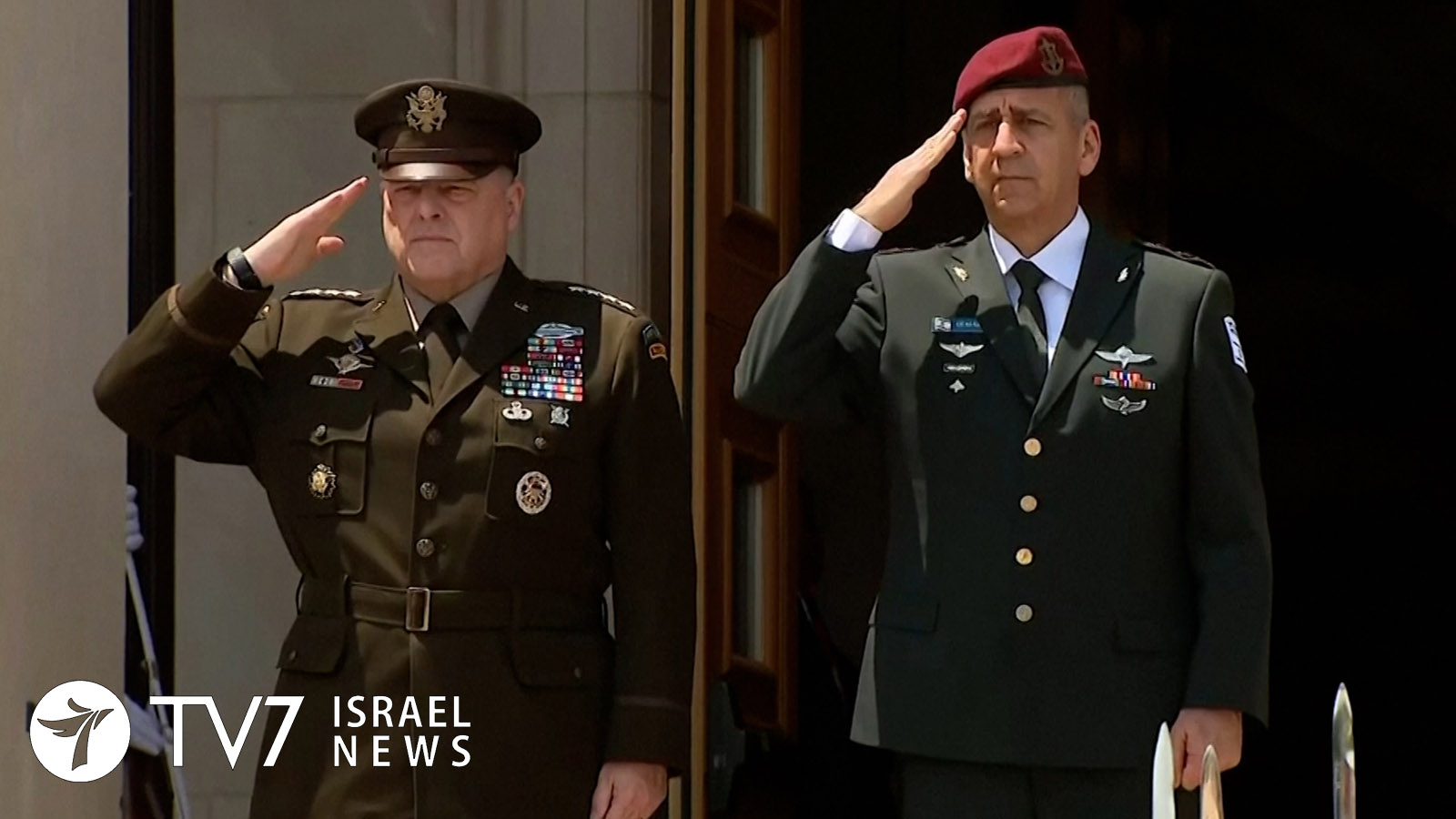IDF Chief of Staff Lieutenant General Aviv Kochavi held talks with the United States Joint Chiefs of Staff Four-Star General Mark Milley and Secretary of Defense Lloyd Austin at the Pentagon.
The top Israeli military chief is in Washington to hold meetings with his counterparts at the US Armed Forces and Department of Defense, focused on a wide variety of issues related to regional security and stability, topped by threats posed by the Islamic Republic of Iran.
According to the IDF Spokesperson’s Unit, Gen. Kochavi utilized the opportunity to underscore Israel’s opposition to “the threat created by returning to the original nuclear agreement,” while stressing the need to take “all measures” to “prevent Iran from achieving military nuclear capabilities.”
Other topics for discussion included missile capabilities by Lebanon’s Iran-backed Hezbollah militia, challenges regarding the Gaza Strip, and the unbreakable bond between Jerusalem and Washington.
“General Milley reaffirmed of course the US commitment to its relationship with Israel,” said Pentagon Press Secretary John Kirby in a statement, underscoring that, “The US and Israel enjoy strong military-to-military relationship as key partners committed to peace and security in the region.”
Shortly before his arrival in the US, Israel’s new government approved the extension of Gen. Kochavi’s term for a 4th year. He will remain at the helm of the IDF until 16 January 2023.
According to a joint statement from the Prime Minister’s Office (PMO) and the Israeli Ministry of Defense (IMoD), Prime Minister Naftali Bennett welcomed the extension, saying that, “Chief of Staff Kochavi is a professional commander imbued with values who carries out his position with daring and responsibility.”
“The people of Israel can sleep quietly in light of the fact that Chief-of-Staff Kochavi will continue to lead the IDF in meeting the operational challenges facing the State of Israel,” said Bennett, who is a former Israeli Minister of Defense.
Current Defense Minister Benny Gantz commended Gen. Kochavi for leading the IDF “to unprecedented operational achievements in Operation Guardian of the Walls” conflict with Gaza in May. He also vowed to continue working with Kochavi “to advance the Tenufa plan to upgrade the IDF and prepare for all challenges, near and far.”
Gen. Kochavi had contemplated cancelling his trip to the US after over 3 consecutive days of Palestinian airborne arson attacks from Gaza last week, prompting heavy IDF retaliatory airstrikes on military infrastructure belonging to the enclave’s Islamist Hamas rulers.
The escalation marked the most significant violence since a fragile ceasefire ended 11 days of deadly fighting between the two sides last month, presenting the first, early test for Israel’s new government.
“Going forward the basic equation must change. We will not accept any breaches of our sovereignty,” stressed Israeli Defense Minister Benny Gantz after the conclusion of Operation Guardian of the Walls in May, underscoring that “We cannot return to the previous reality, and this campaign was designed to change it.”
Following a situation assessment of the arson attacks, Gen. Kochavi issued orders to step-up preparation for a wide range of scenarios, including the resumption of robust counterterror operations in the Hamas-controlled territory. He cautioned Gaza terror groups that the IDF is “preparing for renewed fighting” and that Israel’s response to would be more punishing than during the May conflict.
Senior Israeli military officials also underscored, that in accordance with new IDF policy in the wake of Operation Guardian of the Walls as well as a change of leadership in Jerusalem, Palestinian incendiary attacks will draw the same response as rockets.
In related developments, Israeli Alternate Premier and Foreign Minister Yair Lapid pledged during a telephone call with US Secretary of State Antony Blinken that Israel will not surprise the United States on matters related to Iran’s nuclear program.
Israeli Opposition Leader Benjamin Netanyahu reacted with outrage, publicly denouncing the statement e as a threat to country’s national security.
After saying that Iran’s program is “designed to produce nuclear weapons to annihilate the state of Israel,” the former Prime Minister said he refused “many” previous requests from the US to “to give such a commitment.”
“There is no greater ally and no greater friend that Israel has like the United States,” said Netanyahu, “But when it comes to matters of our security, our very survival – I’ll always reserve the right to act on our own without informing our American friends. There were times that I did tell them of impending actions; there were many other times that I didn’t. And yet, it took the Lapid-Bennett government 3 days to undermine this important and critical tenant in our national security and that’s why this government is so dangerous to our future. That’s also why we will bring them down a lot faster than you think.”
Netanyahu’s remarks drew rebuke from both the Prime Minister and Alternate Premier, who accused the former Israeli premier of acting irresponsibly and of sacrificing Israel’s national interests in the service of his own political needs.
One senior official cited by the public KAN radio station insisted that the US is fully aware that Israel not only retains it right to self-defense, but that a military option is being prepared. The issue, said the official, would not be discussed at the diplomatic level, but rather senior political and defense leaders.
When asked about Israel’s “no surprise” pledge regarding Iran during a press briefing, State Department Spokesperson Ned Price responded, “when it comes to the comments from the Opposition Leader, what I would say is that Israel is a close security partner. We share information, we work together across a range of shared concerns and shared challenges, and it is in that context that we work together and will continue to do so, again, across a wide array of mutual threats.”
